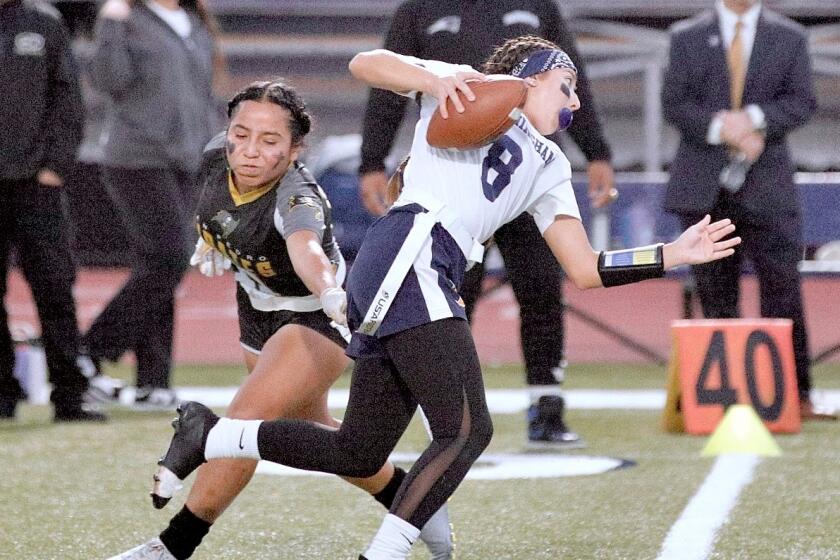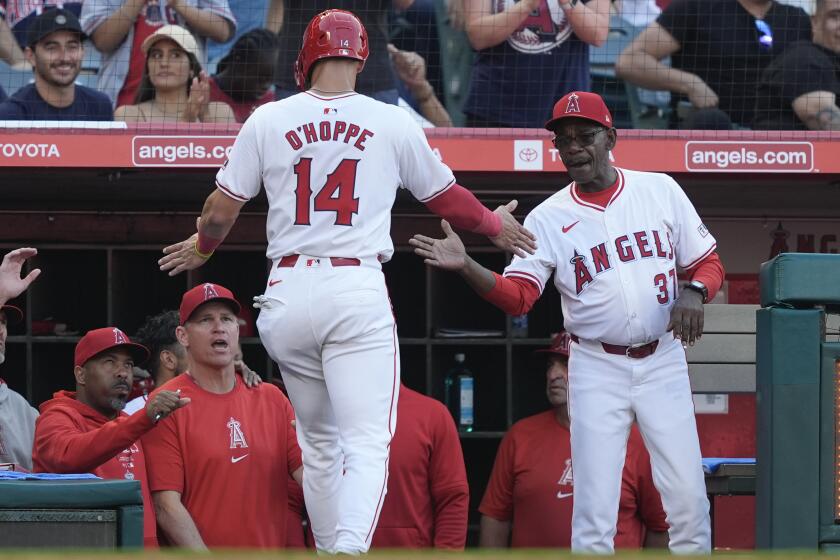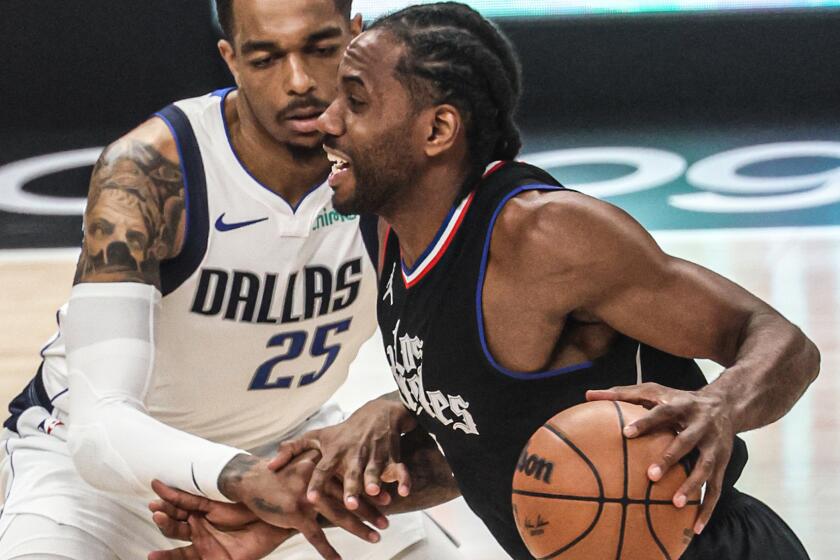Fantasy leagues play on
Die-hard baseball fan Terry Haney got his wish Monday when the U.S. Supreme Court rebuffed Major League Baseball’s argument that fantasy sports leagues be required to pay a license for the right to use player names and plug runs, hits and errors into their popular online games.
As a youngster growing up in San Diego during the early 1960s, Haney freely incorporated baseball statistics gleaned from newspaper box scores into a rudimentary board game. Last year, Haney -- now a 55-year-old retired hog trader in Iowa -- parlayed his love for baseball’s myriad metrics into a $100,000 prize in a national fantasy baseball league.
That MLB and its players union wanted to put the national pastime’s treasure trove of game-related statistics under lock and key left Haney baffled: “I almost hoped that the justices would look at MLB and ask them ‘Why . . . are you wasting our time?’ ”
The Supreme Court did the next best thing, fantasy sports league operators said, by refusing to review the case that MLB and its players union doggedly had pursued after losing an initial court decision in 2005.
The justices’ decision was a setback not only for baseball players, but for other professional athletes who maintained that outside companies had no right to “exploit players’ identity for commercial gain.” The NFL, NBA and NHL had supported baseball’s players and owners in their appeal to the court.
The court’s refusal also throws into question any licensing deals already in place, something MLB had said amounted to “billions of dollars.” When MLB appealed to the high court in February, it argued that such deals could be jeopardized if companies had a free-speech right to use the names of famous people without permission.
The largest fantasy leagues generally are licensed by MLB, including those run by ESPN and Fox Sports; they. had no immediate comment on the case.
MLB’s Advanced Media department declined to comment on the case, and MLB Players Assn. spokesman Greg Bouris said in an e-mail the union was “considering our options at this time.”
The fact that fantasy sports is big business is no small part of this, generating an estimated $500 million from fees, advertising and other revenue, said Jeff Thomas, president of the 150-member Fantasy Sports Trade Assn.
The St. Louis-based fantasy league operator that brought the lawsuit successfully countered that ballplayers are well-known to the public so that their names and statistics can be used freely, without paying for the privilege.
Last June, an appellate court said statistics used in fantasy baseball games are “all readily available in the public domain, and it would be strange law that a person would not have a 1st Amendment right to use information that is available to everyone.”
Monday’s decision “to use a baseball analogy, was a home run for fantasy sports companies,” said Chris Russo, founder of New York-based Fantasy Sports Ventures Inc., which operates a popular fantasy sports website. “Fantasy sports has been growing, but this decision is going to further accelerate that growth.”
Fantasy leagues let fans prove their managerial mettle by assembling dream teams of athletes and competing for increasingly large prizes. Consider the sales pitch one fantasy fishing website uses to hook anglers: “You sign up, pick 10 anglers, and you could be well on your way to winning a million dollars or more.”
Another measure of the growing sophistication of what once was seen as a nerdy preoccupation with statistics: When Haney won the top prize in Krause Publications’ fifth annual National Fantasy Baseball Championship, fantasy players conducted their imaginary draft in a real Las Vegas hotel ballroom.
The fantasy concept is simple. Assemble a group of fans in an online forum, hold a player draft and use real statistics to power imaginary contests. Rules can range from simple, where anything goes, to very realistic; some leagues, for example, even impose salary caps.
The result can be an addictive blend for statistics freaks and even average fans who think they can outmanage the professionals.
Haney had read about fantasy sports years ago but thought himself too busy to bother with an imaginary game. In 2001, he joined his first league and drafted such players as the Chicago Cubs’ Kerry Wood and the Montreal Expos’ Ugueth Urbina.
In his first game as a fantasy manager, Haney found himself cheering for Wood. But after the starting pitcher was pulled he switched gears and cheered for Urbina, who eventually was credited with a save. “My wife couldn’t figure out what was going on,” Haney said. “She said, ‘I thought you were rooting for the Cubs.’ ”
Fantasy play was decidedly more work-like in 1980 when Daniel Okrent, who subsequently served as the New York Times’ public editor, co-founded the trend-setting Rotisserie Baseball League. Players had to scramble to find playmates and relied on the mail or balky fax machines to track the games.
For decades, big-league sports leagues and player unions seemed content to ignore fantasy leagues.
“They laughed at us and slammed the door in our faces,” Okrent said last year when asked about MLB’s initial reaction to his league.
Benign neglect, however, gave way to avid interest as online leagues grew in popularity.
Fantasy players spend several hours each week online. Most of the web-based leagues charge fees to join and fees for making trades, e-mail or mobile updates and glossy publications.
Russo’s website, for example, offers fans more than 150 links to companies that offer all sorts of statistical information, and offers fans immediate updates when players are injured, traded or retire.
Oddly enough, the St. Louis-based fantasy league operator that brought the case had been paying fees to MLB. It brought the lawsuit only after MLB opted not to renew its license.
“When you’re dealing with someone as big as baseball, with the power and connections they have, today’s decision gives you a lot of faith in the system,” said Charlie Wiegert, a vice president with the company known as Fanball.com.
The company argued it did not need the permission of baseball to use the player’s names and statistics, and it won free-speech victories from a federal judge and the U.S. Court of Appeals in St. Louis.
Okrent applauded the Supreme Court decision -- as much for 1st Amendment rights as for the pleasure fans get from their games. He says he still plays fantasy games -- albeit a “radically reduced, vastly simplified version. We call it AARP Rotisserie, or slow pitch.”
--
david.savage@latimes.com
--
Begin text of infobox
Doing research
Top 10 online sports destinations for April 2008:
*--* Yahoo! Sports 19,207 ESPN 19,114 MLB.com 12,483 FOX Sports on MSN 12,456 CBSSports/CSTV Network 10,046 AOL Sports 9,964 EBay Sports 8,926 SI.com 8,252 NFL Internet Network 7,149 Fantasy Sports Ventures 5,532 *--*
Note: Unique audience figures are rounded off to the nearest thousand.
Source: Nielsen online
More to Read
Go beyond the scoreboard
Get the latest on L.A.'s teams in the daily Sports Report newsletter.
You may occasionally receive promotional content from the Los Angeles Times.











